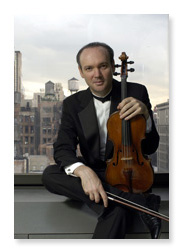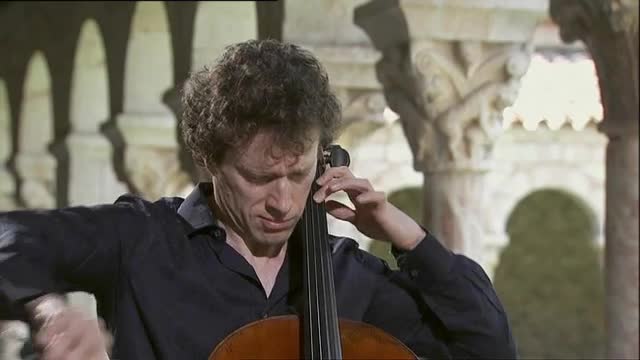
A violist of considerable artistic strength, Paul Neubauer studied with Alan de Veritch, Paul Doktor, and William Primrose and holds a master’s degree from The Juilliard School of which he is now a faculty member. At twenty-one he became the youngest-ever principal string player of the New York Philharmonic Orchestra. Neubauer is distinguished not only by his versatile playing style, but also by a significant number of premières: notably of relatively recently composed concertos by Tower, Penderecki, Picker, Jacob, Ott and Friedman, but perhaps most famously in a pair of New York concerts where he gave for the first time the revisions of Bartók’s Viola Concerto (which he helped to prepare with Peter Bartók and Nelson Dellamaggiore) and Bruch’s Double Concerto for Clarinet and Viola (with David Shifrin). Neubauer also pursues a teaching career at the institution that furnished him with an unmistakable solidity of technique, the Juilliard School.
His charismatic playing can be heard in the very varied if necessarily small selection of his artistry listed here. In Debussy’s Sonata for Flute, Viola and Harp (included on a 1999 Gramophone Award-winning release Complete Chamber Music of Claude Debussy), his tone combines seamlessly with the diverse timbral qualities of the other instruments to great effect; his pizzicato works especially effectively with the harp in the middle movement, and Debussy’s gamelan-inspired writing is imbued with great colour in the finale. A more conventional post-Romanticism is found in Dohnányi’s Op. 10 Serenade, and here one should note how Neubauer’s tone expertly spans the gap between Gary Hoffman’s relatively restrained cello playing and Joseph Silverstein’s rather wobbly violin vibrato; although the viola seems a little peripheral in the Scherzo, in the other four movements Neubauer is a sensitive and characterful player, as indeed in the 2 Rhapsodies by Loeffler, a one-time pupil of Joachim whose music spans the Germanic and French styles of late Romanticism.
Outstanding performances include Biscardi’s The Viola Had Suddenly Become a Voice. This is an elegiac and impassioned soliloquy for solo viola, inspired by Andrea Camilleri’s 2003 novel La voce del violino (The Voice of the Violin) and composed in memory of Jacob Glick, a violist and teacher who championed eighteenth-century viola d’amore music but also premièred over 200 works and encouraged study of new music. Recorded in 2004, Joan Tower’s Wild Purple (written for Neubauer who also gave the première of her Viola Concerto Purple Rhapsody) is another solo work delivered with great commitment. There is an avowed, yet heavily shrouded, derivation from Messiaen’s Quatuor pour la fin du temps, and the work exploits sonorities specific to the viola, in particular using the lower strings to great effect. The Walton Viola Concerto with the Bournemouth Symphony Orchestra under Andrew Litton (1996) is a masterpiece, with a freshness to the interpretation that balances carefully-considered gestures with clarity and pseudo-percussiveness in passages of the middle movement. One of the finest interpretations of the work on record, this recording is a testimony to Neubauer’s consummate skill and convincing artistry.
© Naxos Rights International Ltd. — David Milsom (A–Z of String Players, Naxos 8.558081-84)
| Title | |
| BACH, J.S.: Cello Suite No. 3 / MOZART, W.A.: Clarinet Quintet in A Major (Festival Pablo Casals de Prades, 2010) | |

|
BACH, J.S.: Cello Suite No. 3 / MOZART, W.A.: Clarinet Quintet in A Major (Festival Pablo Casals de Prades, 2010)
Composers:
Bach, Johann Sebastian -- Mozart, Wolfgang Amadeus
Artists:
Bertrand, Emmanuelle -- Charlier, Olivier -- Chee-Yun -- Demarquette, Henri -- Diaz, Andres -- Lethiec, Michel -- Neubauer, Paul -- Salque, Francois
Label/Producer: Festival Pablo Casals de Prades |
